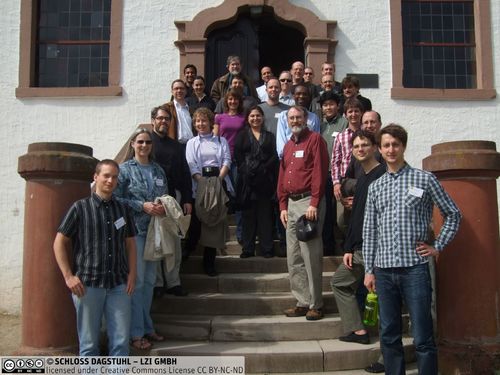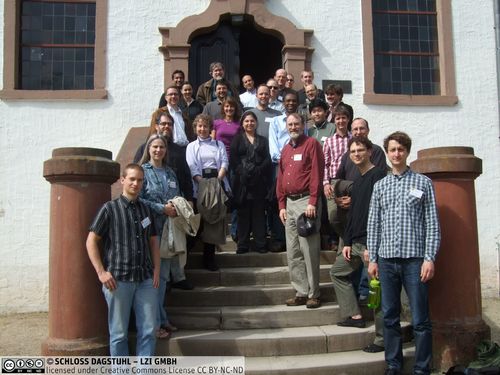Dagstuhl Seminar 11141
Plan Recognition
( Apr 03 – Apr 08, 2011 )
Permalink
Organizers
- Tamim Asfour (KIT - Karlsruher Institut für Technologie, DE)
- Christopher W. Geib (University of Edinburgh, GB)
- Robert P. Goldman (SIFT - Minneapolis, US)
- Henry A. Kautz (University of Rochester, US)
Contact
- Susanne Bach-Bernhard (for administrative matters)
Schedule
Plan recognition, activity recognition, and intent recognition all involve making inferences about other actors from observations of their behavior, i.e., their interaction with the environment and with each other. The observed actors may be software agents, robots, or humans. This synergistic area of research combines and unifies techniques from user modeling, machine vision, intelligent user interfaces, human/computer interaction, autonomous and multi-agent systems, natural language understanding, and machine learning. It plays a crucial role in a wide variety of applications including:
- assistive technology
- software assistants
- computer and network security
- behavior recognition
- coordination in robots and software agents
- e-commerce and collaborative filtering
This Dagstuhl seminar brought together researchers with a wide range of interests and backgrounds related to plan and activity recognition. It featured a substantial set of longer tutorials on aspects of plan and activity recognition, and related topics and useful methods, as a way of establishing a common vocabulary and shared basis of understanding. These were:
- Plan recognition and discourse;
- Plan recognition and psychology;
- Probabilistic methods;
- Plan recognition and learning;
- Grammatical methods and
- Planning and plan recognition.
The common ground constructed by these tutorials provided a basis that individual researchers could build upon when sharing their specific interests and developments.
One challenge to progress in plan recognition is that there has not been a shared agreement about what constitutes plan recognition: what are its inputs and outputs, and what constitutes a good answer. In particular, this has inhibited progress because it is difficult to clearly compare new work in plan recognition with preceding work (quantitative comparisons are almost impossible), there is a paucity of shared data sets, etc. Coming into the seminar, the organizing committee proposed that the field might be improved by the introduction of a plan recognition competition, modeled on competitions in AI planning (the International Planning Competition), SAT solving, etc. Discussions at the seminar concluded that it would be premature to introduce such a competition at this time. Participants felt that a more productive use of community resources would be to develop a shared repository of plan and activity recognition data sets. A number of participants volunteered to provide their data sets, and there has been movement towards establishing a common public repository.
- Tamim Asfour (KIT - Karlsruher Institut für Technologie, DE)
- Chris L. Baker (MIT - Cambridge, US)
- Francis Bisson (University of Sherbrooke, CA)
- Susanne Biundo-Stephan (Universität Ulm, DE)
- Nate Blaylock (IHMC - Pensacola, US)
- Michael Brenner (Universität Freiburg, DE) [dblp]
- Will Bridewell (Stanford University, US)
- Cristina Conati (University of British Columbia - Vancouver, CA) [dblp]
- Thomas G. Dietterich (Oregon State University, US) [dblp]
- George Ferguson (University of Rochester, US)
- Hector Geffner (UPF - Barcelona, ES) [dblp]
- Christopher W. Geib (University of Edinburgh, GB)
- Robert P. Goldman (SIFT - Minneapolis, US)
- Jerry R. Hobbs (USC - Marina del Rey, US) [dblp]
- Tetsunari Inamura (National Institute of Informatics - Tokyo, JP)
- Froduald Kabanza (University of Sherbrooke, CA) [dblp]
- Henry A. Kautz (University of Rochester, US) [dblp]
- Peter Kiefer (ETH Zürich, CH) [dblp]
- Kathryn B. Laskey (George Mason University - Fairfax, US)
- Yves Lesperance (York University - Toronto, CA) [dblp]
- John Maraist (SIFT - Minneapolis, US)
- David Pattison (University of Strathclyde, GB)
- David Pynadath (USC - Playa Vista, US)
- Matthew Stone (Rutgers University - Piscataway, US)
- Ruben Strenzke (Universität der Bundeswehr - München, DE)
- Gita Reese Sukthankar (University of Central Florida - Orlando, US)
- Dorit Zilberbrand (Givat Shmuel, IL)
Keywords
- Artificial intelligence
- plan recognition
- intent recognition
- activity recognition



